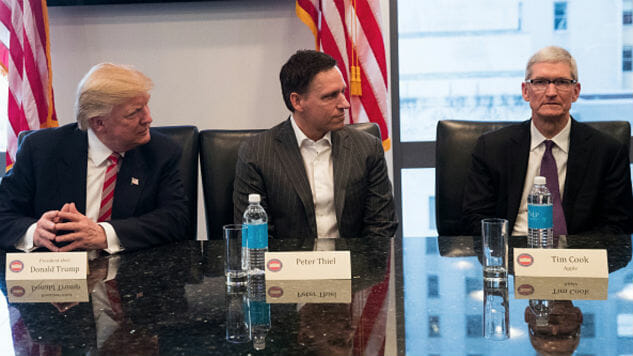Tech’s Giants Have United Against One Foe: Trump
Photo by Drew Angerer / Getty Images
As President Donald Trump sent US airports into protests and immigrant families into disarray last weekend with his 90-day travel ban on seven countries, eyes turned to the influential for how they would react. Barack Obama, opposition politicians, and celebrities have all criticized the ban that covers seven countries with Muslim majority populations— Syria, Iraq, Iran, Yemen, Libya, Somalia, and Sudan. The Syrian ban is indefinite.
Several major tech companies took a firm stance against Trump’s executive order. Google CEO Sundar Pichai recalled more than 100 employees back to the US that are affected by the order. He slammed Trump for instigating a “personal cost” against these employees and thousands of others in similar situations.
In an email to staff, Apple CEO Tim Cook said Trump’s order was “not a policy we support” and that “Apple would not exist without immigration”.
“The Executive Order’s humanitarian and economic impact is real and upsetting,” chimed in Twitter’s Jack Dorsey. “We benefit from what refugees and immigrants bring to the U.S.” Meanwhile Twitter-owned Periscope added a defiant new tagline to its loading screen: “Proudly made in America by immigrants”.
“We should also keep our doors open to refugees and those who need help,” said Mark Zuckerberg. Microsoft CEO Satya Nadella, himself an immigrant, took a stance against the order too, echoing his competitors.
It seemed like this was the one thing that united the goliaths of Silicon Valley, who are usually locking horns over selling products and amassing user bases. But statements and emails are one thing, action is another.
Google co-founder Sergey Brin took part in a protest at San Francisco airport at the weekend. So too did Y Combinator president Sam Altman.

Photo by Win McNamee / Getty Images.
Lyft donated $1 million to the American Civil Liberties Union and Uber launched a $3 million fund to help drivers affected by the order. Though Uber, always courting controversy, was also dealing with its own mess at the weekend when users called for a boycott over the ride-hailing app pouncing on JFK airport during a taxi strike.
Airbnb CEO Brian Chesky vowed to offer free housing to any travelers that were stranded as a result of the chaos.
Messaging app Viber announced free calls between the US and the seven countries implicated in the immigration ban.
On Monday, Amazon and Expedia joined a federal lawsuit, filed in Washington State, challenging Trump’s order, calling it unconstitutional. “No one is above the law — not even the President,” said Attorney General Bob Ferguson. “And in the courtroom, it is not the loudest voice that prevails. It’s the Constitution.”
Several more of these tech companies are meeting this week, reports Reuters, to discuss joining an amicus brief in support of a case challenging the executive order. The meeting is being led by GitHub and attendees reportedly including Google, Airbnb, and Netflix.
The reaction in the tech community globally has mirrored that of Silicon Valley. While Canada’s Prime Minister Justin Trudeau assured refugees that they are welcome in Canada, the founders of more than 200 tech firms in Canada also lodged their support for accepting more people into the country.
German software giant SAP took a page from its US counterparts with its CEO, American Bill McDermott, issuing a message of support to its 84,000 employees around the world.
Entrepreneurs from the seven countries, or of dual nationality, that relocated to the States now find themselves in a difficult situation too. Swedish/Iranian businessman Sorosh Tavakoli, the founder of adtech firm VideoPlaza and who now lives in New York, said he [link in Swedish] “simply cannot leave and then come back to the US”.

Photo by Bruce Bennett / Getty Images.
The order has even hindered a forthcoming meeting for non-profit ICANN, the internet governing body, with at least two delegates unable to travel to the US.
Trump’s executive order has repercussions far beyond the seven countries that he has singled out.
Tech companies aren’t shy about the positive effect that immigration has on their bottom line either. There’s a talent shortage. According to Aaron Levie, CEO of Box, moves like Trump’s will have a very tangible effect on the hiring of skilled immigrants.
There are further fears over plans for various other visa programs. Californian Democrat Congresswoman Zoe Lofgren has introduced legislation that could stifle the H-1B visa program, popular within the tech industry, for hiring foreign workers. The visa is particularly popular among Indian professionals coming to the US. Under Lofgren’s proposal, the minimum required salary to be paid to such a worker would be boosted from $60,000 to $130,000. Lofgren said it would stop companies “replacing” Americans.
Despite such a wave of criticism and protest, Trump has remained steadfast in his conviction, regardless of emotional and economic arguments. On Tuesday he swiftly moved to fire dissenting acting attorney general Sally Yates over her order to the justice department to not enforce the president’s executive order. The White House said she was “betraying” the justice department.
Trump also gave the boot to the acting director of US Immigration and Customs Enforcement, Daniel Ragsdale, who was only a week and a half into his position.
Both sides aren’t backing down anytime soon.







































